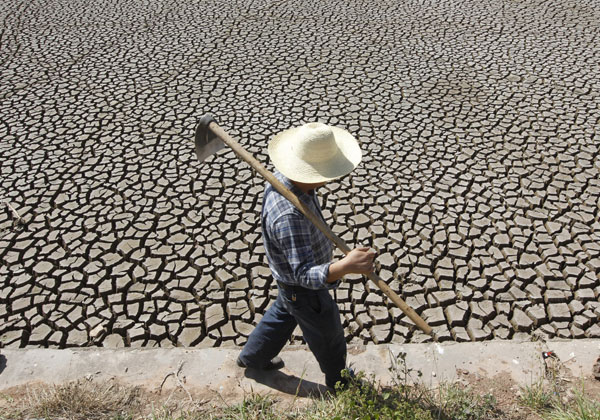 |
|
A farmer passes a dried up basin on Feb 28 in Shilin Yi autonomous prefecture, Kunming, the capital of Yunnan province. The lingering drought has reached 15 cities and autonomous prefectures in the province, affecting 5.58 million people. [For China Daily]
|
"The water's good for four or five cycles, at least half a month," the 69-year-old housewife said.
"Our ox has to drink the water we use for washing our feet.
"But we won't even be able to afford to use any water this way if the rain doesn't come in the next few days," she said.
For many villagers like Wang in Songming county, Yunnan province, conserving water is not a choice — it is an absolute necessity.
Regular droughts in winter, spring and early summer started in 2009 and have continued to affect rural and mountainous areas of Southwest China this year, reshaping the lifestyles of people and causing a major shift in the agricultural industry.
The well in Wang's yard has dropped to less than one meter deep, forcing her to walk 20 minutes a day to fetch water from a nearby reservoir, which is also in danger of drying up.
The lingering drought has hit 15 cities and autonomous prefectures in Yunnan, affecting 5.58 million people, according to the latest provincial civil affairs department statistics, and of those, 1.2 million face drinking water shortages.
This year's drought has also caused the loss of more than 557,000 hectares of crops, with 70,000 hectares of land facing complete crop failures — an estimated economic loss of up to 2.77 billion yuan ($445.4 million), authorities said.
In Songming county, many crops, such as wheat and peas, planted in mountainous areas, can be seen withered and dried out.
Ma Jixian, a 60-year-old villager, said shepherds are even being allowed to let their sheep graze in some fields planted with broad beans. "This is the only use for these crops now," he said.
The owner of the field switched from rice to broad beans last year as the irrigation source in the nearby reservoir had dried up. This year he will offer the land to farmers to cultivate vegetables in greenhouses.
Elsewhere, the agricultural shift caused by the drought is palpable: dried fishing ponds are being converted into vegetable fields, flower market gardens are also being turned over to growing simple crops.
However, at the top of the county government's agenda is ensuring a water supply for people and their livestock, especially in mountainous areas.
"In the mountains, we have to deliver the drinking water in trucks if the rain doesn't come," said Bi Jianwen, deputy director of Songming's water authority.
He added that more than 7,000 residents are facing water shortages in remote villages, which normally rely on water stores.
The government has built 763 storage ponds for households in mountainous areas this year.
In the Chuxiong Yi autonomous prefecture, where the drinking water of more than 152,000 people is now under threat, authorities said they have devoted more than 220,000 people and 31 million yuan to drought-relief, building 530 wells and 187 pump stations.
Experts say that climate change is a factor, as the province received less than normal rainfall during last year's rainy season and recorded higher temperatures in January and February.
"The amount of rainfall last year is directly related to the drought situation this year and has a lot to do with the amount of water preserved in reservoirs and storage ponds," Bi said.
According to Yunnan's meteorological bureau, the average temperature in 104 counties and prefectures is now 2 C higher than in the past.
"The higher temperatures increase evaporation and make it more difficult for reservoirs and ponds to retain water," said Li Xie, an engineer on a water conservation project being completed by the water authority in Songming.
In most areas of Yunnan, which lie in tropical and subtropical areas, rain is usually concentrated between July and October and rainfall is scarce during the rest of the year.
Close to 90 percent of the province is mountainous, which increases the difficulty of construction of irrigation and water conservation projects.
Actions inefficient
Zheng Xiaoyun, a water resources researcher at Yunnan Academy of Social Sciences, said that four consecutive years of drought during spring and winter in Yunnan indicate that seasonal droughts could become the norm rather than the exception in the future.
However, he said government action currently being taken to deal with the water shortage remains short term and inefficient.
Even though the measures being taken have improved people's water supply, "the authorities are just not paying enough attention to the longer-term drought problems," he said.
Zheng added that the current drought will have far-reaching effects on the local community, including forcing more workers from rural areas to become migrant workers in other provinces, putting further strains on local authority finances.
"The continuous drought will continue to force the government to devote more resources to relief efforts, taking money away from other important areas, which will certainly affect the local development," he said, insisting the government should develop longer-term plans, even to the extent of creating special administrations which could manage all the drought-relief efforts.
Contact the writers at xuwei@chinadaily.com.cn and liyingqing@chinadaily.com.cn
 8:59 PM
8:59 PM
 specialshowtoday
specialshowtoday

 Posted in:
Posted in: 

0 comments:
Post a Comment